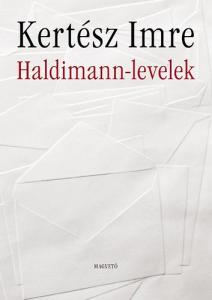Something Else
In 1977, two years after the original release of Fateless, Imre Kertész learned from one of his acquaintances that a review of his book was published in Neue Zürcher Zeitung. Soon, Kertész sent a letter to the author of the review, the Swiss literateur of Hungarian origin, Eva Haldimann. This started a correspondance that went on for 25 years. Haldimann Letters, published by Magvető includes a selection of these letters, mostly from Kertész.
The letters' biographical references, self-reflective parts and the narrative position taking form, relate these texts to Kertész' essays and even moreso to his two diaries, however it is worth taking a look at the differences as well. The most important one is clearly that the letters are the products of everyday communication and the only relation between them originates from a timely sequence.
So, as the author doesn't appear through an artistic medium, it's easier to get hold of the real biographical identity behind the texts, which is on of the most significant concomitant of the letters; they show the author, hidden in the background of literary works, from a new perspective compared to the earlier, more confession-like texts.

Fitting the genre, the events of private life get more attention than ever, and are often related to the Hungarian political circumstances of the time. On the other hand, compared to Galley-Boat Log (Gályanapló) and Someone Other (Valaki más), craft-confessions are played down and the reflection to take in the works of Kertész is brought forward. The change in both thematic proportions is related to a well-defined position that frequently appears in Kertész's books, showing the author of the letters in an incomprehensible isolation from society.
The evaluation of the political environment, a theme which did not play a significant role in previous works, is particularly interesting. A considerable part of the letters deals with this topic, which doesn't do any good for the text. Often, you're faced with the thoughts of a resentful writer instead of a judicious thinker. As a result of this resentment, a real pursuit of causes, a realistic evaluation of the situation are missing. The texts are rather characterised by simple declarations, underplaying any interpretations differing from those of the author.
So, it is only the perspective of an isolated individual from which we can size up the political and social state. Kertész rarely focuses on the larger context, yet he often pronounces his thoughts as being identical to the public opinion. The defects of this perspective cause plenty of generalizations and polarizations ("Hungaristic National Radio", "Arrow Cross Hungary"), a frequent mention of the real, yet incredibly inflated feeling of persecution ("we live occupied in this new horror that broke out and seems to last forever. Fortunately, I still have my passport."), the picturing of the author as the one and only authentic interpreter of the world and its events ("it all takes form in front of our eyes but at home, they can't notice"), the degrading and simplifying of Hungary's intellectual conditions ("critic desert", "so-called Hungarian literary life") and meanwhile, the critiqueless idealisation of the quite superficially defined 'European' circumstances.

Luckily, not all the letters are characterised by this simplifying point of view. The correspondance also reveals the rich notional background of Kertész' works, which makes the letters become sort of an intellectual biography, similar to his previous texts. Here however, you can follow the author's thoughts through his experiences.
Another thematic element is the reception of Kertész' works. Since this is the theme that started the correspondance, it is not surprising how significant a role it plays in the letters. In some cases (probably the most exciting parts of the book) the reflection of this means understanding, but most of the time, it doesn't go beyond the problems of publishing and editing; these must be important to the correspondents and readers with philological interests but probably do not concern a wide audience.
The above-mentioned imperfections are of course related to the letters being actual letters. You can't have high expectations with a friendly conversation that was never meant to be published. And although the intellectual values of the texts aren't as deep as in previous works and there's no place to really take in aesthetic experiences, there's still something that this collection of letters can offer that no other Kertész-book could. In his letters, the author expresses his deepest fears ("I have to consider emigration"), joys ("You can't imagine how much the appreciation of an independent mind means to me in my everyday strife with silence") and deceptions ("I'd lie if I said I'd been bombed by offers from publishers"), describes and interprets the high points and key experiences of his career, and releases his personal feelings that are much more moderate in his other works. With these elements, the author offers insight into his close friendship with Eva Haldimann and introduces his private self.

Lastly, the book's design and collection of notes is also worth mentioning. As usual, Magvető's publication is of a high standard with a remarkably thorough collection of notes (mostly identical to Ingrid Krüger's work in the German edition), giving the reader a complete reference to construe the letters. The book also includes a relatively long appendix including portions from Eva Haldimann's reviews as well as interviews with the author. While these reviews showing Haldimann's thoughs put the letters in an interesting perspective, the interviews don't seem to fit the rest of the book's contents.
Haldimann Letters, as a unique piece, effectively integrates into and completes Kertész' oeuvre, while its collection of notes offer at least as remarkable an insight into the circumstances of the birth of Kertész' works as the letters themselves. With all its values and faults, this collection is worth reading, and as a historical piece and literary datum, it is in many ways capable of becoming a base of reference to the reception of the work of Imre Kertész.
Kertész Imre: Haldimann-levelek, Magvető, Budapest, 2010.



Facebook-hozzászólások